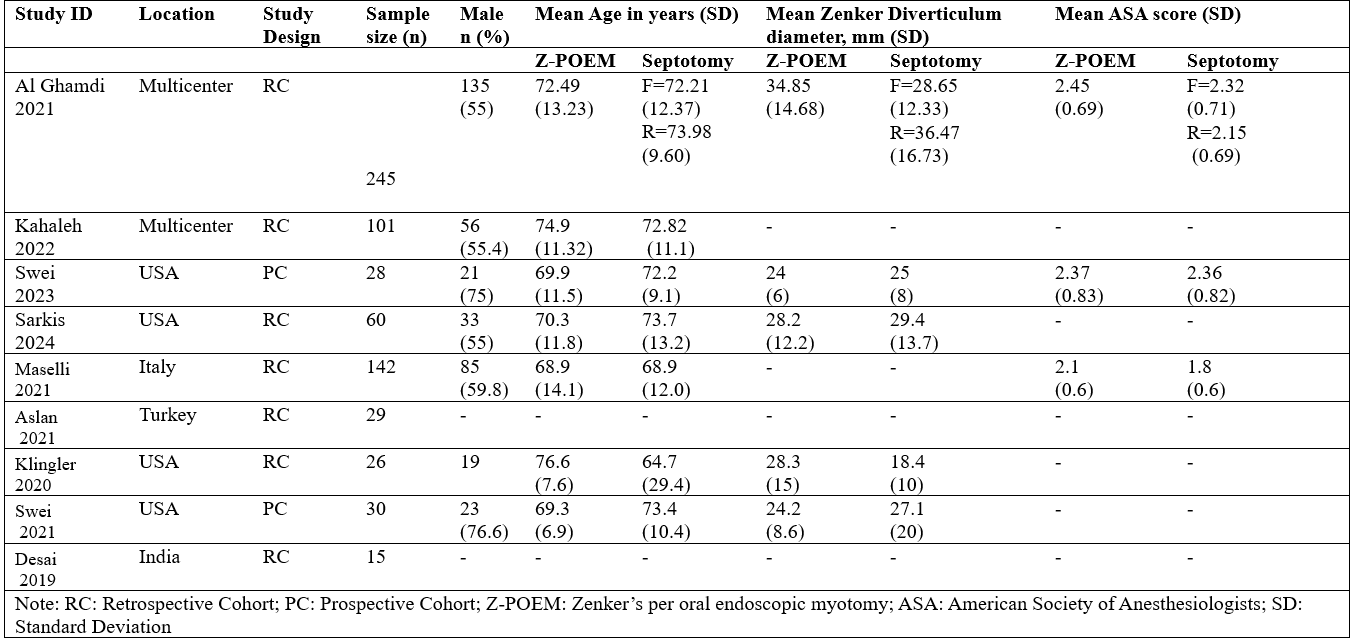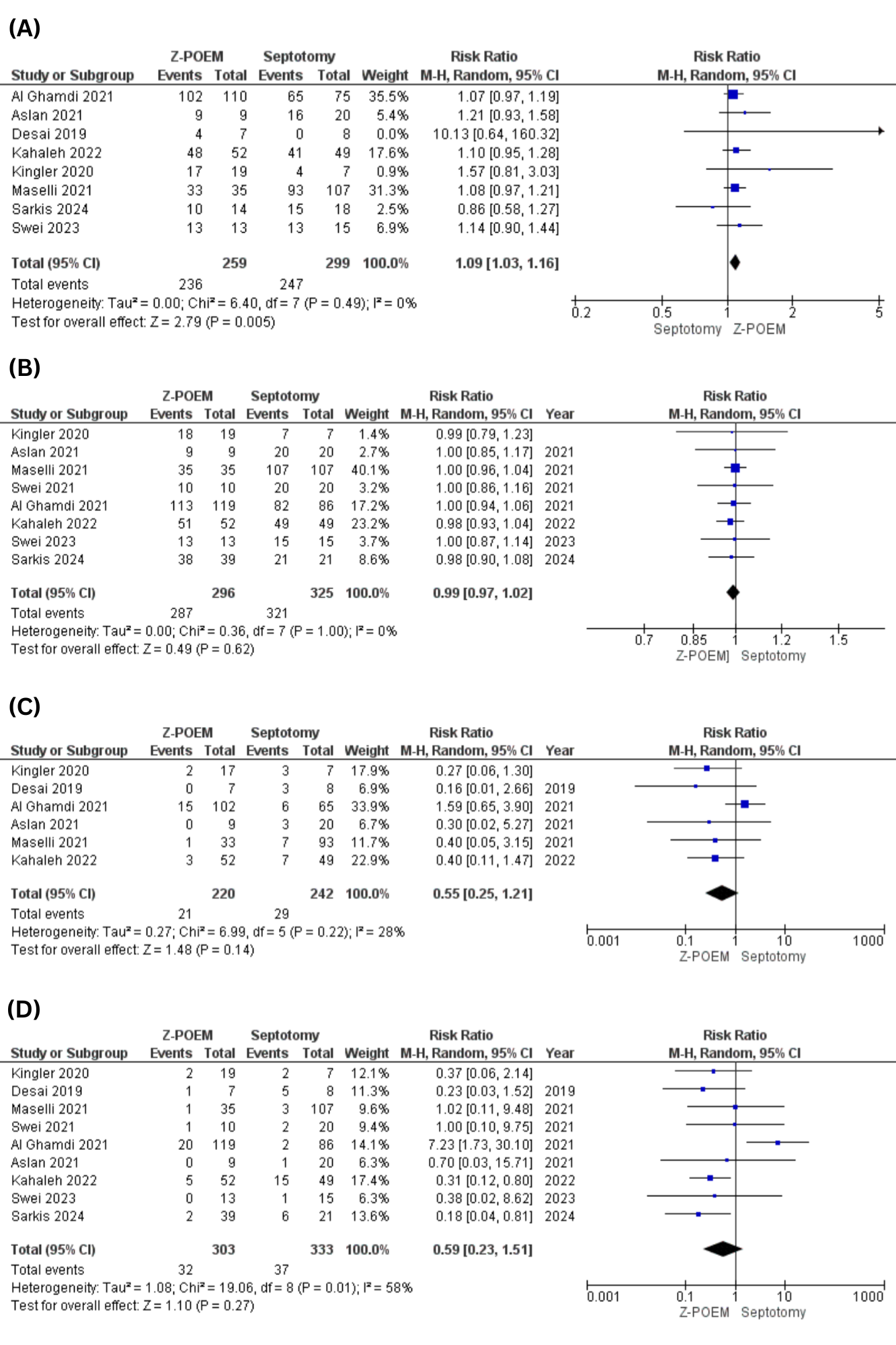Tuesday Poster Session
Category: Esophagus
P4905 - Is Peroral Endoscopic Myotomy Superior to Septotomy for Zenker’s Diverticulum? A Systematic Review and Meta-Analysis
Tuesday, October 28, 2025
10:30 AM - 4:00 PM PDT
Location: Exhibit Hall

Fariha Hasan, MD
Cooper University Hospital
Camden, NJ
Presenting Author(s)
Fariha Hasan, MD1, Zain Ul Abideen, MBBS2, Muhammad Hassan Waseem, MBBS3, Sania Aimen, MBBS4, Noor Ul Huda Ramzan, MD5, Shahryar Khan, MD6, Prasun K.. Jalal, MD7
1Cooper University Hospital, Camden, NJ; 2King Edward Medical University, Lahore, Punjab, Pakistan; 3Allama Iqbal Medical College, Lahore, Punjab, Pakistan; 4Quetta Institute of Medical Sciences, Quetta, Balochistan, Pakistan; 5University of Texas Southwestern Medical Center, Dallas, TX; 6University of Kansas Medical Center, Kansas City, KS; 7Baylor College of Medicine, Houston, TX
Introduction: Zenker’s diverticulum (ZD) management has evolved significantly, transitioning from open surgery to advanced endoscopic techniques with septotomy being the traditional approach. This includes the flexible and rigid endoscopic septotomy. Per oral endoscopic myotomy (POEM) has shown promising safety and efficacy in the treatment of ZD, but comparative data between POEM and septotomy remain sparse. This meta-analysis aimed to compare the efficacy and safety of POEM versus septotomy for ZD.
Methods: Electronic databases, including PubMed, Cochrane Central, and ScienceDirect, were searched from inception till January 2025. The Risk Ratios (RR) and Mean differences (MD) with 95% Confidence Intervals (CIs) were pooled under the random effects model using Review Manager version 5.4.1 for the dichotomous outcomes. The primary and secondary endpoints of interest were technical success, clinical success, re-interventions, and adverse events. The quality assessment was done through the Newcastle Ottawa Scale, whereas Publication bias was assessed through funnel plots and Egger’s regression test.
Results: Nine studies encompassing 676 patients were included in this meta-analysis. POEM showed a statistically significant increase in clinical success (RR=1.09, 95%CI:[1.03,1.16]; p=0.005; I2=0%). Regarding the technical success, no significant difference was observed between the two groups (RR= 0.99; 95%CI:[0.97,1.02]; p=0.62; I2=0%). Other outcomes including the symptom recurrence (RR=0.55, 95%CI:[0.25, 1.21]; p=0.14; I2=28%), adverse events (RR= 0.59; 95%CI:[0.23, 1.51]; p=0.27; I2=58%), procedural time (MD= -1.21 min; 95%CI:[-9.28,6.86 ]; p=0.77; I2=85%) and length of hospital stay (MD= -0.07; 95%CI:[-0.55,0.42 ]; p=0.79; I2=52%) were also comparable between the POEM and septotomy groups.
Discussion: POEM demonstrates a significantly higher clinical success rate compared to traditional endoscopic septotomy in the management of Zenker’s diverticulum, indicating its superior effectiveness in symptom resolution. Despite this advantage, both POEM and septotomy show comparable outcomes in terms of technical success, symptom recurrence, adverse events, procedural time, and length of hospital stay, underscoring that POEM maintains a similar safety profile and procedural feasibility. These findings suggest that POEM not only offers enhanced therapeutic efficacy but also represents a safe and minimally invasive alternative to septotomy.

Figure: Figure 1: Forest Plots for (A)Clinical Success (B)Technical Success (C)Symptom Recurrence (D)Adverse Events

Figure: Figure 2: Baseline Characteristics of the Included Studies
Disclosures:
Fariha Hasan indicated no relevant financial relationships.
Zain Ul Abideen indicated no relevant financial relationships.
Muhammad Hassan Waseem indicated no relevant financial relationships.
Sania Aimen indicated no relevant financial relationships.
Noor Ul Huda Ramzan indicated no relevant financial relationships.
Shahryar Khan indicated no relevant financial relationships.
Prasun Jalal: AbbVie – Consultant. Gilead Sciences – Consultant.
Fariha Hasan, MD1, Zain Ul Abideen, MBBS2, Muhammad Hassan Waseem, MBBS3, Sania Aimen, MBBS4, Noor Ul Huda Ramzan, MD5, Shahryar Khan, MD6, Prasun K.. Jalal, MD7. P4905 - Is Peroral Endoscopic Myotomy Superior to Septotomy for Zenker’s Diverticulum? A Systematic Review and Meta-Analysis, ACG 2025 Annual Scientific Meeting Abstracts. Phoenix, AZ: American College of Gastroenterology.
1Cooper University Hospital, Camden, NJ; 2King Edward Medical University, Lahore, Punjab, Pakistan; 3Allama Iqbal Medical College, Lahore, Punjab, Pakistan; 4Quetta Institute of Medical Sciences, Quetta, Balochistan, Pakistan; 5University of Texas Southwestern Medical Center, Dallas, TX; 6University of Kansas Medical Center, Kansas City, KS; 7Baylor College of Medicine, Houston, TX
Introduction: Zenker’s diverticulum (ZD) management has evolved significantly, transitioning from open surgery to advanced endoscopic techniques with septotomy being the traditional approach. This includes the flexible and rigid endoscopic septotomy. Per oral endoscopic myotomy (POEM) has shown promising safety and efficacy in the treatment of ZD, but comparative data between POEM and septotomy remain sparse. This meta-analysis aimed to compare the efficacy and safety of POEM versus septotomy for ZD.
Methods: Electronic databases, including PubMed, Cochrane Central, and ScienceDirect, were searched from inception till January 2025. The Risk Ratios (RR) and Mean differences (MD) with 95% Confidence Intervals (CIs) were pooled under the random effects model using Review Manager version 5.4.1 for the dichotomous outcomes. The primary and secondary endpoints of interest were technical success, clinical success, re-interventions, and adverse events. The quality assessment was done through the Newcastle Ottawa Scale, whereas Publication bias was assessed through funnel plots and Egger’s regression test.
Results: Nine studies encompassing 676 patients were included in this meta-analysis. POEM showed a statistically significant increase in clinical success (RR=1.09, 95%CI:[1.03,1.16]; p=0.005; I2=0%). Regarding the technical success, no significant difference was observed between the two groups (RR= 0.99; 95%CI:[0.97,1.02]; p=0.62; I2=0%). Other outcomes including the symptom recurrence (RR=0.55, 95%CI:[0.25, 1.21]; p=0.14; I2=28%), adverse events (RR= 0.59; 95%CI:[0.23, 1.51]; p=0.27; I2=58%), procedural time (MD= -1.21 min; 95%CI:[-9.28,6.86 ]; p=0.77; I2=85%) and length of hospital stay (MD= -0.07; 95%CI:[-0.55,0.42 ]; p=0.79; I2=52%) were also comparable between the POEM and septotomy groups.
Discussion: POEM demonstrates a significantly higher clinical success rate compared to traditional endoscopic septotomy in the management of Zenker’s diverticulum, indicating its superior effectiveness in symptom resolution. Despite this advantage, both POEM and septotomy show comparable outcomes in terms of technical success, symptom recurrence, adverse events, procedural time, and length of hospital stay, underscoring that POEM maintains a similar safety profile and procedural feasibility. These findings suggest that POEM not only offers enhanced therapeutic efficacy but also represents a safe and minimally invasive alternative to septotomy.

Figure: Figure 1: Forest Plots for (A)Clinical Success (B)Technical Success (C)Symptom Recurrence (D)Adverse Events

Figure: Figure 2: Baseline Characteristics of the Included Studies
Disclosures:
Fariha Hasan indicated no relevant financial relationships.
Zain Ul Abideen indicated no relevant financial relationships.
Muhammad Hassan Waseem indicated no relevant financial relationships.
Sania Aimen indicated no relevant financial relationships.
Noor Ul Huda Ramzan indicated no relevant financial relationships.
Shahryar Khan indicated no relevant financial relationships.
Prasun Jalal: AbbVie – Consultant. Gilead Sciences – Consultant.
Fariha Hasan, MD1, Zain Ul Abideen, MBBS2, Muhammad Hassan Waseem, MBBS3, Sania Aimen, MBBS4, Noor Ul Huda Ramzan, MD5, Shahryar Khan, MD6, Prasun K.. Jalal, MD7. P4905 - Is Peroral Endoscopic Myotomy Superior to Septotomy for Zenker’s Diverticulum? A Systematic Review and Meta-Analysis, ACG 2025 Annual Scientific Meeting Abstracts. Phoenix, AZ: American College of Gastroenterology.
